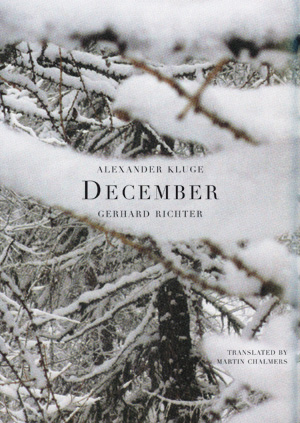December
Alexander Kluge, Gerhard Richter
Translated by Martin Chalmers
5.5 x 7.75 inches, 118pp, 39 colour plates. June 2012
ISBN : 9780857424440
Rs 425.00 (PB)
$25.00 (PB)
£16.99 (PB)
In the historic tradition of calendar stories and calendar illustrations, author and film director Alexander Kluge and celebrated visual artist Gerhard Richter have composed December, a collection of thirty-nine stories and thirty-nine snow-swept photographs for the darkest month of the year.
In stories drawn from modern history and the contemporary moment, from mythology, and even from meteorology, Kluge toys as readily with time and space as he does with his characters. In the narrative entry for December 1931, Adolf Hitler avoids a car crash by inches. In another, we relive Greek financial crises. There are stories where time accelerates, and others in which it seems to slow to the pace of falling snow. In Kluge’s work, power seems only to erode and decay, never grow, and circumstances always seem to elude human control. When a German commander outside Moscow in December of 1941 remarks, “We don’t need weapons to fight the Russians but a weapon to fight the weather,” the futility of his struggle is painfully present.
Accompanied by the ghostly and wintry forest scenes captured in Gerhard Richter's photographs, these stories have an alarming density, one that gives way at unexpected moments to open vistas and narrative clarity. Within these pages, the lessons are perhaps not as comforting as in the old calendar stories, but the subversive moralities are always instructive and perfectly executed.
“More than a few of Kluge's many books are essential, brilliant achievements. None are without great interest.”—Susan Sontag
“Alexander Kluge, that most enlightened of writers.”—W.G. Sebald
Gerhard Richter is one of the most respected visual artists of Germany, and his seminal works include Atlas (1964), October 18, 1977 (1988) and Eight Grey (2002).
Alexander Kluge is one of the major German fiction writers of the late 20th century and an important social critic. As a filmmaker, he is credited with the launch of the New German Cinema movement.
Martin Chalmers is a translator and editor. He grew up in Glasgow, Scotland. His translations include works by Hans Magnus Enzensberger, Hubert Fichte, Ernst Weiss, Herta Mueller, Alexander Kluge, Emine Sevgi Oezdamar and Erich Hackl. At present Chalmers lives in Berlin.
Photography
German List
Fiction

 Buy (PB)
Buy (PB)